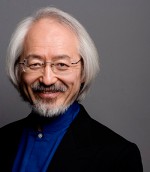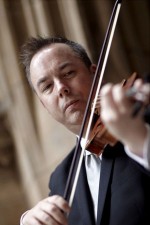Title
After a very successful second year, which included performances and master classes with William Christie, Christopher Hogwood, Harry Bicket, Enrico Onofri, and many others, the Juilliard Historical Performance program will culminate its season with two landmarks. The first is the graduation of the first class of students from the program. The second is the program’s largest performance project yet: a collaborative production of Johann Sebastian Bach’s St. Matthew Passion with the Yale Institute of Sacred Music (I.S.M.). Performances will take place in New Haven and New York City in early May.
Body
Christoph Wolff, an eminent Bach scholar and a professor at both Juilliard and Harvard, calls the St. Matthew Passion, referred to by the Bach family as the “great Passion,” a “work of extraordinary musical dimensions.” First performed on Good Friday, 1727, the work’s salient features include a double chorus and orchestra that are used in dialogue or opposition. The choruses often function as the crowd or turba and respond, sometimes violently, to the text sung by the Evangelist and other characters.
The story of the Passion (Christ’s sufferings in the last few days of his life) is told through both standard (secco) recitative and more overtly dramatic recitative accompanied by highly varied instrumental ensembles ranging from strings and flutes to the tenor oboe unique to Bach: the oboe da caccia. The text is a combination of Gospel and sacred poetry by the German poet who wrote under the pseudonym Picander and frequently composed librettos for Bach.
There are also meditations on the Passion story in the form of arias, duets, and choruses with obbligatos featuring flutes, oboes of all sizes, violin, and viola da gamba. “It is a distinguishing mark … that Bach chose to draw deliberately on the complete repertoire of forms cultivated in the sacred and secular music of his day,” Wolff wrote in Johann Sebastian Bach: The Learned Musician, noting that even Baroque opera “could not compare in its range of compositional types and forms.” One of the most interesting features of the St. Matthew Passion is the pervasive repetition of the same chorale, though differently harmonized, which descends in key throughout the piece. Wolff observed that Bach’s use of an extremely wide range of keys, instruments, and forms represented his exploration of “the widest possible range of musical expression.”
Discussions about the Juilliard-Yale collaboration, the first between the schools’ two programs, began more than a year ago. Monica Huggett, the artistic director of the Historical Performance program, had been contemplating programming Bach’s smaller-scale St. John Passion. As the program’s administrative director Benjamin Sosland explained, “We were looking for ways to make sure our Historical Performance students got experience playing an oratorio since this repertoire is so central to our specialty.” The one missing element was a suitable choral ensemble.
At about the same time, the Yale Schola Cantorum and the Yale Voxtet vocal ensemble, which are part of the college’s Institute of Sacred Music, also wanted to program one of the Bach Passions, but did not have a full orchestra to accompany them. Historical Performance faculty member Robert Mealy, who also teaches at the Yale School of Music, brought the groups together. Masaaki Suzuki, a visiting professor of choral conducting at I.S.M., proposed programming the St. Matthew Passion, which uses a much larger orchestra than the St. John. A few members of the Yale Baroque Ensemble will be joining Juilliard415 as will Juilliard Historical Performance faculty Sandra Miller, Baroque flute, and Gonzalo Ruiz, Baroque oboe.
Suzuki, who will conduct this four-ensemble collaboration, is most well-known for his work with the Bach Collegium Japan, an ensemble he founded in 1990 that is currently completing a critically acclaimed cycle of recordings of J.S. Bach’s cantatas. Suzuki has also worked with many other ensembles ranging from Collegium Vocale Gent and the Freiburger Barockorchester to the Boston Symphony Orchestra and the Deutsches Symphonie Orchester Berlin. In addition to his activity as a conductor, Suzuki is renowned for his performances on the organ and harpsichord, also specializing in the music of Bach.
Mealy, who will be the concertmaster for these performances, has had a rich and varied career performing with many of the world’s leading Baroque ensembles, from Tafelmusik and Les Arts Florissants to the Handel and Haydn Society and many others. He is also the concertmaster of the distinguished Boston Early Music Festival orchestra.
In addition to performances in New York at the Park Avenue Christian Church and New Haven, Connecticut, at Woolsey Hall, the Juilliard/Yale ensemble will travel to Italy in mid-May for performances in Rome, Florence, and Milan. According to Sosland, “We are in discussions about another large-scale oratorio project for next year with Yale. Hopefully the St. Matthew will be just the first of many such collaborations in future years.”






